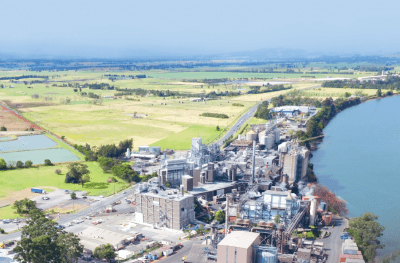AUSTRALIA’S Department of Agriculture and Water Resources (DAWR) has issued a permit for a single shipment of bulk wheat which will break the impasse on grain imports that grain users in drought-affected eastern states have been seeking for months.

Manildra Group’s Shoalhaven Starches plant.
Trade sources have told Grain Central the shipment is for 57,000 tonnes of wheat to be loaded at Vancouver on the Canadian west coast.
The cargo will discharge at Port Kembla in New South Wales prior to transfer to Manildra Group’s Shoalhaven Starches plant at nearby Bomaderry.
DAWR said the vessel was due to arrive in six to eight weeks.
Manildra said this was the first time in the company’s 67-year history that exceptional drought circumstances had forced the requirement to import.
“Due to the worst drought in 116 years, high-protein wheat which is critical to the Shoalhaven Starches wheat-processing plant is in short-supply,” Manildra Group said in a statement.
“The permit will secure hundreds of regional jobs and the continuation of wheat processing at the plant.
“Shoalhaven Starches’ preference is to use Australian wheat, and Manildra Group will continue to buy high-protein wheat from Australian farmers as supply permits.”
Manildra Group said its inland NSW flour mills at Manildra, Gunnedah and Narrandera would continue to be supplied exclusively with Australian wheats.
“So far in 2018-19, Manildra Group has sourced as much high-protein wheat on the Australian market as is available, and continues to do so.”
Mixed reactions
Many in the agripolitical and farming community are surprised, or even shocked, by the permit being issued so close to Saturday’s federal election, and when government departments are operating in caretaker mode.
Others including GrainGrowers chair and Mallee-district farmer, Brett Hosking, are more circumspect.
“The development is understandable in the world market,” he said.
“There have been discussions about grain imports since November last year, so it’s no surprise, whether it’s just before an election or not.
“The reality is that we’re an exporter, and the ball doesn’t always bounce the way we want it to.”
Manildra’s Shoalhaven Starches is a major global gluten exporter, and its recently upgraded facility which also produces ethanol is said to use more than 800,000t of grain per annum.
“For Manildra, they are trying to hang on to export markets, and they need to be able to source the grain to do it.”
Price impact possible
Mr Hosking said news of Canadian wheat being imported could have an impact on domestic pricing.
“As a grower, it makes you feel a little uneasy.
“I’ve still got wheat on my farm, and so do many other growers.
“It means there’s 57,000 tonnes less demand than there would otherwise have been, but in the the scheme of domestic grain consumption, that’s not a lot.
“The price impact will be negligible, but it would be wrong to say there would not be an impact.”
A DAWR spokesperson said whether or not to source bulk grain domestically or from overseas was a commercial decision by the importer.
Some would argue the Canadian wheat will have a similar effect on local wheat prices to the boat wheat from Western Australia and South Australia which has been arriving in eastern Australian ports since late 2017.
Interstate wheat has often been priced below grain held on farm, which has tended to be sold on spikes in the market created when the supply of boat wheat has been interrupted by export shipping schedules and holiday periods.
Management of biosecurity risk
What imported wheat brings with it that domestic wheat does not is a biosecurity risk.
“What we need to do is make sure there isn’t any risk to any biosecurity for any part of agriculture,” Mr Hosking said.
In announcing the permit yesterday, DAWR said it was “subject to strict conditions to manage any biosecurity risk”.
“The import conditions require that the grain is sourced from areas assessed as presenting a low plant and animal biosecurity risk and impose strict movement, storage and processing controls within Australia.”
Representing feed milling companies, Stock Feed Manufacturers Council of Australia executive officer Duncan Rowland said revised biosecurity protocols played a part in ironing out price variances between imported and Australian grain.
“There was always going to have to be at least one shipment,” Mr Rowland said of the drought-stretched supply chain on Australia’s east coast this year.
“The revised protocols announced earlier this year seek to put the risk back onto the risk creator in respect of treatments, inspection and mitigation strategies for risks associated with the supply chain to the manufacturing sites.”
For metropolitan area or up-country usage Mr Rowland said the approach had been opened up to evaluate, individually rather than as fixed metro or country, taking into account manufacturing sites and aspects such as transport biosecurity risk to nearby cropping or grazing.
Opposition response
Shadow Minister for Agriculture Joel Fitzgibbon said the news of the importation of grain would a shock to most Australians.
“It should be a reality check for a Coalition Government which has refused to take climate change seriously, and failed to work with the agriculture sector to build resilience to drought,” Mr Fitzgibbon said.
“The need to import grain comes at a cost to our local growers and poses a risk to our biosecurity.
“Like many, I’m disappointed by the development.”

Imported grain means Australian grain growers are subject to biosecurity risk. The absurd policy of mandating ethanol production from grain must be reviewed and stopped. Making fuel from grain is simply nuts when there isn’t enough grain to feed stock our feedmills. Could happen again in 2019 … If you want ethanol (which we don’t – electric cars are coming – fast) develop a second generation industry or import Brazilian ethanol.